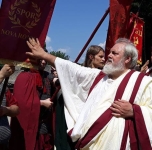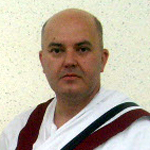Censor (Nova Roma)
(Updated) |
|||
| (8 intermediate revisions by 2 users not shown) | |||
| Line 1: | Line 1: | ||
[[Category:Magistracies (Nova Roma)]]{{LanguageBar|Censor (Nova Roma)}} | [[Category:Magistracies (Nova Roma)]]{{LanguageBar|Censor (Nova Roma)}} | ||
{{NR Magistracy articles}} | {{NR Magistracy articles}} | ||
| − | + | <onlyinclude>The censorship is the most respected and sacred [[magistracies (Nova Roma)|magistracies]] of Nova Roma. There are '''two ''censores''''' who are elected '''only for census years''', that is, once '''in every two-and-a-half years period''' by the [[comitia centuriata (Nova Roma)|''comitia centuriata'']], and unlike other magistrates, they have a '''18 months term of office''', however, by tradition, they are expected to step down as soon as they have completed the census. In corporate terminology, the censors are the '''secretaries of the corporation'''. The ''censores'' have with the highest ''[[auctoritas]]'' to safeguard the public morality and honor but '''[[Classification of magistracies (Nova Roma)|third in rank]]''' after the ''consules'' and ''praetores'', because they do not possess ''[[imperium]]'', and have no power to convene either the senate or an assembly of the people. Their principal duty of the censors is to conduct the '''[[census]]''' twice in every five year period, the traditional ''[[lustrum]]'', and, as a part of the census, to maintain the register of citizens, equestrians and senators, to classify all citizens according to their merit, to allocate citizens into classes, centuries and tribes, to distribute awards and reprimands, to elevate or remove members of the equestrian order, to appoint and remove members of the senate, and to guard public honor and morality. It is also the censors' job to set the general direction of public works and finances between two censuses, in cooperation with the aediles. | |
| − | + | The '''eligibility requirements''' for censor are set by the [[lex Tullia annalis (Nova Roma)|lex Tullia annalis]]: only those [[assidui]] can be candidates who are at least 40 years old, and have previously served as [[consul (Nova Roma)|consul]]. The ''censores'' enter office on {{Jan 1}} (1 January) of the year for which they are elected to hold the census, or if they are elected out of order, they enter office as soon as elected.</onlyinclude> | |
| − | '' | + | |
| − | + | Since censors hold office only in census years, '''in most years there are no censors'''. '''At the moment'''', in {{ {{CURRENTYEAR}} }}, '''there are no censors in office'''. The next census, thus the next term of office for censors will start no later than 2778 AUC (2025). When there are no censors in office, the Censorial Office staff carries out the routine duties of the censors under the supervision of the [[consul (Nova Roma)|consuls]]. In the absence of the censors, the [[praefectus rei publicae administrandae (Nova Roma)|praefectus rei publicae administrandae]] is in charge of the Censorial Office. | |
| − | + | ||
| − | + | ||
| − | + | __NOTOC__ | |
| + | == Duties and powers of the censors == | ||
| − | + | The [[Lex Cornelia Domitia de re publica constituenda (Nova Roma)|lex Cornelia Domitia de re publica constitudenda]] says about the ''censores'': | |
| − | + | ||
| − | + | ||
| − | + | ||
| − | + | ||
| − | + | ||
| − | + | ||
| − | + | ||
| − | + | <div class="scriptum"> | |
| + | :'''1.''' Censor. Two censors shall be elected by the Comitia Centuriata to be regarded as the most sacred magistrates kept in the highest respect, to serve a term lasting a maximum of eighteen months, to be elected once in every thirty months, to conduct the census of Nova Roma, which shall be initiated no later than in the thirtieth month after the lustrum of the previous census, observing that one in two censuses be completed before the end of every fifth calendar year of Nova Roma. The censors shall not necessarily remain in office until the end of their term, but they may resign from office after they have completed the census and the lustrum. If a censor dies, resigns, or is removed from office, the remaining censor shall resign no later than within a nundinum. When there are no censors in office, their duties listed under IV.A.1.c-d, without the right to award public knighthoods, shall be continued by the Censorial Office directly administered by the praefectus rei publicae administrandae under the legal authority of the consuls who shall only supervise the lawfulness of the operation of the Censorial Office; the rest of the censorial powers shall remain in abeyance. All censorial decisions shall be made by unanimous collegial decision. The censors shall have the following honors, powers, and obligations: | ||
| + | ::'''a.''' To hold potestas and the auspicia maiora, and to conduct the census with the lustrum, which shall include the lectio senatus (appointment and removal of senators), the recognitio et probatio equitum (elevation to, or removal from, the Equestrian Order), the regimen morum (general control, with disciplinary power, over the public conduct and morals of citizens, including the punishments of tribu movere: to re-allocate an assiduus citizen from a rural tribe to an urban tribe; senatu movere: to remove a senator from the senate, equum adimere: to remove the rank of “eques equo publico” from an equestrian; in aerarios referre: to remove the voting rights of citizens by exclusion from all tribes and centuries, simultaneously removing them from the Senate and the Equestrian Order, too), to possess an incomplete ius coercitionis limited to be used within their duties, and the ius edicendi restricted only to issue those edicta that are necessary to carry out those tasks in which they are mandated by law to engage; | ||
| + | |||
| + | ::'''b.''' To review, evaluate and set the direction of the public works, properties (in cooperation with the aediles) and finances of the state between two censuses; | ||
| + | |||
| + | ::'''c.''' To maintain the album civium (list of citizens) including the list of gentes, the allocation of citizens into tribes, centuries and classes as described by law, and other appropriate information regarding them; | ||
| + | |||
| + | ::'''d.''' To maintain the ''album equitum'' (lists of members of the equestrian order), including the power to add and remove names on that list; | ||
| + | |||
| + | ::'''e.''' To maintain the ''album senatorium'' (list of Senators), including the power to add and remove names on that list according to qualifications set by law; | ||
| + | |||
| + | ::'''f.''' To safeguard the public morality, virtue, honor and decency through public chastisements (animadversio) and through the collegial administering of notae; | ||
| + | |||
| + | :::'''i.''' The nota censoria shall include the public explanation of the reasons for the disciplinary action and the recommended behavior which could convince the censors to lift the nota; | ||
| + | |||
| + | :::'''ii.''' The nota censoria shall impose one or more punishments that the censors are empowered to inflict, listed at IV.A.1.a; | ||
| + | |||
| + | :::'''iii.''' A nota shall remain in force until such time as it is removed by the same or by subsequent censors; | ||
| + | |||
| + | ::'''g.''' To appoint apparitors and other officers to assist with administrative and other tasks, as they shall see fit. | ||
| + | </div> | ||
| + | <br> | ||
| + | __TOC__ | ||
==Historical overwiew== | ==Historical overwiew== | ||
| Line 29: | Line 43: | ||
==List of ''censores'' of Nova Roma== | ==List of ''censores'' of Nova Roma== | ||
| − | + | Originally, in the first year of Nova Roma, just like in ancient Rome, the powers of the censors were part of the powers of the consuls (and, by delegation, of the praetors). Due to limited Roman legal understanding, the founding generation of Nova Roma assigned the office of censor to these magistrates, though they could have just have the consuls or praetors attend the censorial duties. After the resignation of consul Fl. Vedius Germanicus, his duties were assigned to praetor Dec. Iunius Palladius. M. Cassius Iulianus retained censorial powers after his term of office as consul. The fourth appointment of censor was made by the first dictator of Nova Roma, Fl. Vedius, who appointed himself on {{Jul 4}} {{1999}} in place of M. Cassius. The new constitution that took force that year made the two censorial positions to be elected in alternate years so as to have a one-year overlap of terms with a two year long term of office (in the first constitution the censorship was meant to have a 5 year term of office). The first duly elected censor of Nova Roma was L. Sulla, serving for the next two years, and his colleague, Fl. Vedius was the censor to leave office first in the new one-year overlap staggered system. | |
| − | + | {{:Fasti censorii (Nova Roma)}} | |
| − | + | ||
| − | + | ||
| − | + | ||
| − | + | ||
| − | + | ||
| − | }} | + | |
Latest revision as of 20:05, 2 November 2023
Home | Latíné | Deutsch | Español | Français | Italiano | Magyar | Português | Română | Русский | English
⚜⚜⚜ Site Index - Key Pages ⚜⚜⚜
Consul
Praetor
Censor
Aedilis curulis
Aedilis plebis
Tribunus plebis
Quaestor
Vigintivir
Tribunus militum
Praefectus rei publicae administrandae
Curator aerarii
Curator rei informaticae
Classification of magistracies
The censorship is the most respected and sacred magistracies of Nova Roma. There are two censores who are elected only for census years, that is, once in every two-and-a-half years period by the comitia centuriata, and unlike other magistrates, they have a 18 months term of office, however, by tradition, they are expected to step down as soon as they have completed the census. In corporate terminology, the censors are the secretaries of the corporation. The censores have with the highest auctoritas to safeguard the public morality and honor but third in rank after the consules and praetores, because they do not possess imperium, and have no power to convene either the senate or an assembly of the people. Their principal duty of the censors is to conduct the census twice in every five year period, the traditional lustrum, and, as a part of the census, to maintain the register of citizens, equestrians and senators, to classify all citizens according to their merit, to allocate citizens into classes, centuries and tribes, to distribute awards and reprimands, to elevate or remove members of the equestrian order, to appoint and remove members of the senate, and to guard public honor and morality. It is also the censors' job to set the general direction of public works and finances between two censuses, in cooperation with the aediles.
The eligibility requirements for censor are set by the lex Tullia annalis: only those assidui can be candidates who are at least 40 years old, and have previously served as consul. The censores enter office on Kal. Ian. ‡ (1 January) of the year for which they are elected to hold the census, or if they are elected out of order, they enter office as soon as elected.
Since censors hold office only in census years, in most years there are no censors. At the moment', in M. Metello D. Aurelio cos. ‡ MMDCCLXXIX a.u.c., there are no censors in office. The next census, thus the next term of office for censors will start no later than 2778 AUC (2025). When there are no censors in office, the Censorial Office staff carries out the routine duties of the censors under the supervision of the consuls. In the absence of the censors, the praefectus rei publicae administrandae is in charge of the Censorial Office.
Duties and powers of the censors
The lex Cornelia Domitia de re publica constitudenda says about the censores:
- 1. Censor. Two censors shall be elected by the Comitia Centuriata to be regarded as the most sacred magistrates kept in the highest respect, to serve a term lasting a maximum of eighteen months, to be elected once in every thirty months, to conduct the census of Nova Roma, which shall be initiated no later than in the thirtieth month after the lustrum of the previous census, observing that one in two censuses be completed before the end of every fifth calendar year of Nova Roma. The censors shall not necessarily remain in office until the end of their term, but they may resign from office after they have completed the census and the lustrum. If a censor dies, resigns, or is removed from office, the remaining censor shall resign no later than within a nundinum. When there are no censors in office, their duties listed under IV.A.1.c-d, without the right to award public knighthoods, shall be continued by the Censorial Office directly administered by the praefectus rei publicae administrandae under the legal authority of the consuls who shall only supervise the lawfulness of the operation of the Censorial Office; the rest of the censorial powers shall remain in abeyance. All censorial decisions shall be made by unanimous collegial decision. The censors shall have the following honors, powers, and obligations:
- a. To hold potestas and the auspicia maiora, and to conduct the census with the lustrum, which shall include the lectio senatus (appointment and removal of senators), the recognitio et probatio equitum (elevation to, or removal from, the Equestrian Order), the regimen morum (general control, with disciplinary power, over the public conduct and morals of citizens, including the punishments of tribu movere: to re-allocate an assiduus citizen from a rural tribe to an urban tribe; senatu movere: to remove a senator from the senate, equum adimere: to remove the rank of “eques equo publico” from an equestrian; in aerarios referre: to remove the voting rights of citizens by exclusion from all tribes and centuries, simultaneously removing them from the Senate and the Equestrian Order, too), to possess an incomplete ius coercitionis limited to be used within their duties, and the ius edicendi restricted only to issue those edicta that are necessary to carry out those tasks in which they are mandated by law to engage;
- b. To review, evaluate and set the direction of the public works, properties (in cooperation with the aediles) and finances of the state between two censuses;
- c. To maintain the album civium (list of citizens) including the list of gentes, the allocation of citizens into tribes, centuries and classes as described by law, and other appropriate information regarding them;
- d. To maintain the album equitum (lists of members of the equestrian order), including the power to add and remove names on that list;
- e. To maintain the album senatorium (list of Senators), including the power to add and remove names on that list according to qualifications set by law;
- f. To safeguard the public morality, virtue, honor and decency through public chastisements (animadversio) and through the collegial administering of notae;
- i. The nota censoria shall include the public explanation of the reasons for the disciplinary action and the recommended behavior which could convince the censors to lift the nota;
- ii. The nota censoria shall impose one or more punishments that the censors are empowered to inflict, listed at IV.A.1.a;
- iii. A nota shall remain in force until such time as it is removed by the same or by subsequent censors;
- g. To appoint apparitors and other officers to assist with administrative and other tasks, as they shall see fit.
Contents |
Historical overwiew
- Censor overview: a comparison of ancient Roman and Nova Roman censores
List of censores of Nova Roma
Originally, in the first year of Nova Roma, just like in ancient Rome, the powers of the censors were part of the powers of the consuls (and, by delegation, of the praetors). Due to limited Roman legal understanding, the founding generation of Nova Roma assigned the office of censor to these magistrates, though they could have just have the consuls or praetors attend the censorial duties. After the resignation of consul Fl. Vedius Germanicus, his duties were assigned to praetor Dec. Iunius Palladius. M. Cassius Iulianus retained censorial powers after his term of office as consul. The fourth appointment of censor was made by the first dictator of Nova Roma, Fl. Vedius, who appointed himself on a.d. IV Non. Quin. ‡ L. Equitio Dec. Iunio cos. ‡ MMDCCLII a.u.c. in place of M. Cassius. The new constitution that took force that year made the two censorial positions to be elected in alternate years so as to have a one-year overlap of terms with a two year long term of office (in the first constitution the censorship was meant to have a 5 year term of office). The first duly elected censor of Nova Roma was L. Sulla, serving for the next two years, and his colleague, Fl. Vedius was the censor to leave office first in the new one-year overlap staggered system.
























